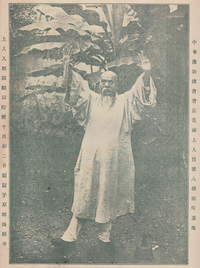Views
Jìchán 寄禪 (1852-1912)
|
|
| Notable Associates:
|
|
Jìchán 寄禪 (1852-1912) was a famous Chán 禪 master and poet during the late Qing. He was an important person in transitional Qing-Republican Buddhism.
Biography
Jìchán's mother died when he was young. In 1868 (Tóngzhì 同治 7), he took tonsure and preliminary ordination under Dōnglín 東林 at Fǎhuá Temple 法華寺 in Xiāngyáng 湘陽. He was 16. When he was 27, he burned off the two smallest fingers on his left hand at Aśoka Temple 阿育王寺 in Níngbō 寧波 as an offering to the relics of the Buddha housed there. He practiced Chán in different places under various masters, and when he was 34 (1888), he returned to Húnán.
Jìchán was abbot of a number of different temples in his lifetime (see below), the last one being the famous Chán temple, Tiāntóng Temple 天童寺 in Níngbō, where he became abbot at age 52.
On April 1, 1912, Jìchán became the president of the Chinese General Buddhist Association 中華佛教總會. On November 10, Jìchán had an argument with Dù Guān 杜關, the Minister of the Interior, over ratification of the Association's charter. This exchange upset Jìchán a great deal and he died that night.
Abbot of
- 衡陽羅漢寺
- 南岳上封寺
- 大善寺
- 密印寺
- 湘陽神鼎山
- 長沙上林寺
- 寧波太白山天童寺
References
- Welch, Holmes. The Buddhist Revival in China. Cambridge: Harvard University Press, 1968. Pp. 35-38.
- 寄禅法师_百度百科
